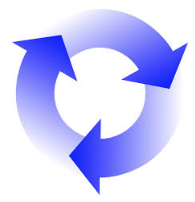
What is a sustainable enterprise, what does it takes to create it, and how can it be achieved and maintained?
What do we actually mean by sustainable enterprise? To sustain means at its most basic level to keep alive or in existence; this is the basic goal of any business. ‘Sustainable business’ goes further by aiming at:
- financial benefits for the company
- natural world betterment
- social advantages for employees and members of the local community
In an ideal world, every business would be sustainable, and therefore inherently a social enterprise. People would just realize it makes more sense for everyone in the long run. That’s clearly not the way things are, although we are witnessing increasing interest in that direction.
A truly sustainable enterprise calls for a different understanding of organizations based on cooperation and win-win. Ecological thinking in its most profound sense understands the implications, both negative and positive, of every strategy, decision and action. There is a way to foster this thinking and embed it within every aspect of our business, and that is by adopting a systemic approach to management.
Goal, Vision, Values
Any enterprise is itself a system. We define a system as a network of interdependent components that work together to achieve the goal of the system.
The goal is by definition a measurable entity so, along with the goal, there has to be a way to measure its achievement. A goal, in order not to be an arbitrary one, must be the offspring of a vision and, in turn, this vision should reflect a basic set of values. The most fundamental prerequisite for a successful enterprise is that all of its members share its vision and the basic values that inspire this vision. Goal, vision and values must portray an idea of future and how their fulfillment will result in the betterment of the lives of everyone in the organization and society at large.
Once goal, vision and values are clear and shared by everyone in the enterprise, then we need to decide how we want to coordinate these efforts. We have to understand, just like in nature, the basic forces that keep the enterprise together and explain how it can function.
The Enterprise as a System
Any organization develops very naturally as a network of interdependent components; what makes this network a system is the definition (and the adherence to) a common goal. In other words, when people start collaborating for a common goal the interdependencies necessary to achieve it can be very easily defined. These interdependencies and interrelations provide a clear understanding of how the system should operate. The design of this system must include customers and suppliers and the way in which all the components of the system are going to benefit from the achievement of the goal. Let’s be as clear as possible on this issue.
Our suppliers (and their suppliers), our customers (and their customers) and we (including our competitors) are part of chains of value. This value is realized when an end user benefits from the product/service these chains deliver. Unless the end user pays for and enjoys the product the chains have delivered, in time nobody truly gains. On the other hand, if chains get better and better at delivering better and better products end-users enjoy, the market grows and with it everybody’s wealth. “The Market” is far bigger than we think and its development is artificially limited by companies’ inadequacies to innovate and take to fruition the potential of innovation.
Results of the Systemic Approach
What can we realistically achieve with this systemic approach? Wealth, not just money, well being, not just profit; an ethical, transparent, environmentally conscious, safe and sustainable chain of efforts aimed at improving everybody’s quality of life through ever improving products and services.
Organizations are vessels; the intrinsic collaborative nature of their work clearly shows that the only meaningful way for any organization to prosper is to become an active vessel, a channel, for the development and distribution of products and services that help people to live better. The only sustainable role for any organization in today’s world is to facilitate for products the fulfillment of their role in the world. Any form of “hedging”, whether of money or goods that hinders this flow only creates artificial scarcity for the temporary and illusory advantage of few. This is the essence of a new, system-based economics. Sustainable enterprise is its engine.
Sign up to our blog here and shift your thinking towards broader, systemic possibilities for yourself and your organization. Intelligent Management provides education and training on systemic management, W. Edwards Deming’s management philosophy and the Theory of Constraints (Decalogue methodology) in North America and Europe.
About the Author
Angela Montgomery Ph.D. is Partner and Co-founder of Intelligent Management and author of the business novel+ website The Human Constraint that has sold in over 20 countries. She is co-author with Dr. Domenico Lepore, founder, and Dr. Giovanni Siepe of ‘Quality, Involvement, Flow: The Systemic Organization’ from CRC Press, New York.





Leave a Reply